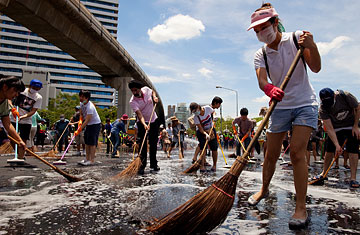
Hundreds of Bangkok residents participate in Bangkok Cleanup Day on May 23, sweeping the streets with soap and water after two months of protests and street fighting left the center of the capital in tatters
Thailand's economy was growing like gangbusters. On May 17, the central bank announced that the country had achieved its highest quarterly growth rate in 15 years, with figures showing a 12% year-on-year increase for the first three months of 2010. Two days later, soldiers used force to disperse antigovernment protesters who had paralyzed central Bangkok for weeks. Violence surrounding the two-month-long demonstrations left 86 dead and more than 1,000 wounded, sparking fears that this year's brief economic boom could dissolve into a bust.
Thailand's economy, however, is proving more resilient than expected. On Thursday, May 27, the Bank of Thailand predicted gross domestic product would still grow between 4.3% and 5.8% for the year, nearly as high as the 6.2% forecast by the World Bank before the violence began. Economic analysts and the business community expressed cautious optimism that the fallout from the civil unrest would be limited and the country would enjoy a year of strong growth. "We think the central bank's estimate is reasonably accurate, although we are pegging growth at between 4% and 5%," says Supavud Saicheua, an economist with Phatra Securities in Bangkok. "But our forecast is uncertain," he added, citing concerns about Thailand's political and security situation and external factors.
Thailand did not escape from its recent woes unscathed. The University of the Thai Chamber of Commerce estimated damages from the protests at roughly $4.6 billion and said they cost the country nearly 1.5% in growth. Those numbers could skyrocket if Thailand's political and social troubles aren't over, and it's not certain that they are.
But this week's positive forecasts are based on the growth driven by robust exports, which have not been seriously damaged by the country's political conflict. China's bottomless demand for Thai electronics, computer components, food products and raw materials has helped stoke its southern neighbor's economy; China now gobbles up 10% of all Thai goods shipped overseas. Exports now account for between 60% and 65% of the Thai economy — nearly double what they did in the late 1990s. The Thai sector suffering most severely from the unrest is tourism, which accounts for more than 6% of gross domestic product and is a key source of jobs and foreign-exchange earnings.
A small blessing is that the bloodshed took place during the low-tourism season. Industry executives hope that confidence in the country as a holiday destination can be restored before the start of the high season in October. "I'm pretty bullish on how Thailand will do economically this year. I believe we will have a relatively quick recovery — even in tourism," says William Heinecke, whose Thailand-based Minor Group owns 16 hotels around the country, along with fast-food and retail businesses. "Tourists were never in any danger, and there were no problems in many places tourists normally go, such as Phuket and Hua Hin."
With anger over the government's crackdown still seething in some rural areas, warnings abound that Thailand could erupt into civil war. But Heinecke does not subscribe to that scenario. "Cool hearts will prevail," he says, claiming there hasn't been a single problem among his 25,000 employees around the country despite their differing political views.
Others, however, maintain that the situation is more precarious. While Thailand has shown great resilience during past troubles, "we should not simply think that every crisis will be overcome easily. The cycle of the recurrence of political breakdowns has become shorter and shorter," says Nandor von der Luehe, chairman of the Joint Foreign Chambers of Commerce of Thailand. The government needs to address the issues of economic inequality that helped spark the protests and ensure that a reconciliation process starts as soon as possible, he says. "If investors do not believe that the problem has been solved, then sooner or later investments will turn to more attractive places."
Still, a lasting crisis in confidence has not yet come to pass. As head of Amata Corporation and owner of Thailand's largest industrial estates, Vikrom Kromadit depends on foreign and local investment to survive. While business was down during the two months of demonstrations, "industries that have already invested here are still looking to expand," he says. Investors who know the country well have not lost interest, but others may be more nervous, he adds.
While much of the public is looking to the government of Prime Minister Abhisit Vejjajiva to solve the issues of inequality and injustice that helped fuel the demonstrations, Heinecke says Thai businesses also have the power to effect positive change in society. "The business community will come together on this," he says. "People have said Thailand has changed and will never be the same. We can never return to what we were, but we can move on to something better."
